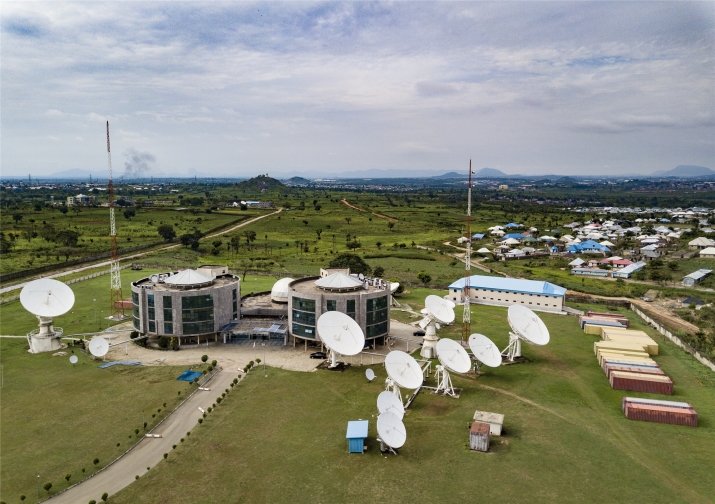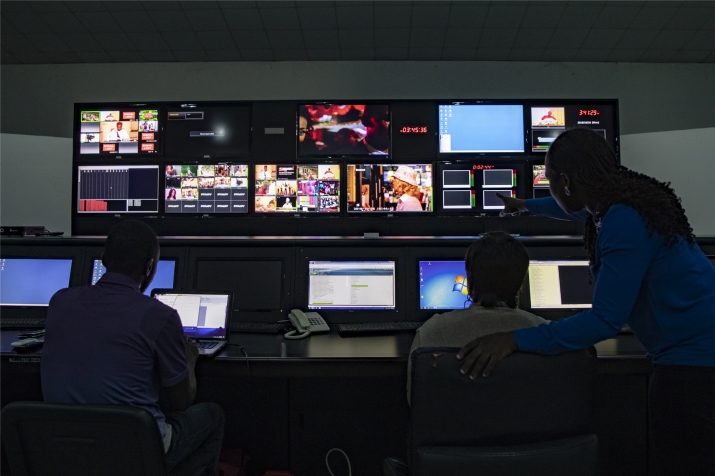|
||||||||||
| Home Nation World Business Opinion Lifestyle ChinAfrica Multimedia Columnists Documents Special Reports |
|
||||||||||
| Home Nation World Business Opinion Lifestyle ChinAfrica Multimedia Columnists Documents Special Reports |
| ChinAfrica |
| Final Frontier Friendship |
| Ongoing outer space cooperation between China and Africa has many practical benefits |
| By Xia Yuanyuan | VOL.11 January ·2019-01-10 |

A ground station in Abuja minitors NIGCOMSAT-1R (CHEN JIAN)
Dianhuo! (We have ignition!) - with these words, the carrier rocket blasted the first Nigerian communications satellite NIGCOMSAT-1 into orbit from Xichang Satellite Launch Center in southwest China's Sichuan Province at 0:01 on May 14, 2007, which marked the beginning of space cooperation between China and Africa.
Over the past 12 years, China-Africa space cooperation has witnessed constant progress in some African countries that have purchased Chinese satellites, developed aerospace infrastructure together and shared satellite resources.
According to insiders, the partnership has helped take China-Africa friendship to a 36,000 km high in outer space and more importantly create great economic and social benefits for African people.
Launching satellites for Africa
In Nigeria, people described the launch of the NIGCOMSAT-1 as "a monumental achievement for Nigerians" and "a beginning of economic and technological emancipation" of the entire African continent, according to local reports.
The satellite was the first of its kind in Africa at the time and the first time a foreign buyer had purchased a Chinese satellite and its launching service. The success was achieved through the joint efforts of both Nigerian Communications Satellite Ltd. and China Great Wall Industry Corp. (CGWIC), an organization authorized by the Chinese Government to provide commercial satellite launch services and satellite systems, and to carry out space technology cooperation.
Since 2004, the two organizations began to work together on the planning of the satellite launch. The satellite, a super hybrid geo-stationary model designed to operate in Africa, parts of the Middle East and Southern Europe, revolutionized telecommunications, broadcasting and broadband multimedia services in Africa, according to insiders.
After its launch in May 2007, China handed it over to Nigeria two months later. However, the following year, NIGCOMSAT-1 stopped operating because the solar array drive assembly failed.
After the failure, CGWIC undertook emergency measures and investigated the cause of the failure. The investigation was transparent and the Nigerian side was regularly updated on the progress, according to CGWIC.
In 2011, CGWIC launched a new replacement communication satellite NIGCOMSAT-1R at the Xichang Satellite Launch Center in Sichuan Province for Nigeria.
"We did not charge Nigeria for the replacement satellite, which is designed to remain operational for 15 years," said an official from CGWIC.
Nigerian Communications Satellite Ltd. Managing Director Timasaniyu Ahmed Rufai called the Chinese response to the satellite failure "commendable."
Now, the satellite is monitored and tracked by a ground station in Abuja, capital of Nigeria, by Nigerian Communications Satellite Ltd., and a ground station in Kashgar, in northwest China's Xinjiang Uygur Autonomous Region, by CGWIC.
The satellite's ground facility in Abuja "had the potential of making Nigeria a major communications hub in the West and Central African region" and prompted Nigeria and neighboring countries to "expand their switching facilities to be able to handle international communication," according to Abdulraheem Isah Adajah, a Nigerian communication official.
Nigeria is not the only country cooperating with China in building its space capability. In December 2017, China launched Algeria's first communication satellite ALCOMSAT-1, which was designed and manufactured by China Academy of Space Technology under China Aerospace Science and Technology Corp.
According to Li Guoping, Spokesman of China National Space Administration, as an important cooperative field, China will continue to strengthen cooperation with African countries in peaceful exploration and utilization of outer space.

NIGCOMSAT-1R has been used for a wide variety of public services such as television broadcasting, emergency communications and remote education (CHEN JIAN)
Benefits to local people
Besides Nigeria, NIGCOMSAT-1R is currently providing broadband services to Gabon, as well as broadcasting services to Botswana and Côte d'Ivoire, according to Abimbola Alale, Chief Executive of Nigerian Communications Satellite Ltd.
"We have plans to reach out to more African countries. The main objective is to improve communications in Nigeria and its environs and then the rest of the African continent. But Nigeria is the main focus and we want to provide communications across the length and breadth of Nigeria," Alale told ChinAfrica.
According to Rufai, NIGCOMSAT-1R helps Nigeria break free from its over-reliance on the oil trade and transform itself into a knowledge-based economy.
Rufai said the satellite also brought benefits to local people. With a designed lifespan of 15 years, NIGCOMSAT-1R has been used for a wide variety of public services such as television broadcasting, emergency communications, remote education and satellite-based signal augmentation, as well as providing people in remote rural villages with Internet access, and saving people phone call charges.
It is also expected to play key roles in e-commerce, improving government efficiency and promoting the development of the digital economy in Nigeria and throughout the entire African continent.
Teaching to fish
According to Alale, CGWIC not only helped launch the satellite, but also offers technological support and training for Nigerian technicians on the management and operation of the satellite.
"CGWIC has trained over 50 Nigerian engineers, so that we could be able to manage our own satellite," she told ChinAfrica.
China is not only cooperating with African countries in satellites management, but also making efforts to strengthen their capability in space science and technology development.
In May 2018, China National Space Administration and National Authority for Remote Sensing and Space Sciences of Egypt signed a memorandum of understanding (MoU) to establish the Egyptian Space City in Cairo, formally initiating the cooperation on the Egyptian Space City Project. According to the MoU, China and Egypt would cooperate on the overall planning, system design, project construction and operational management of the Egyptian Space City.
After the completion of the project, Egypt will greatly improve its ability to independently develop satellites. By then, the country would have an internationally advanced aerospace infrastructure. In addition, during the process, China will also help cultivate scientific and technical personnel for Egypt, so that after the completion of the project, the Egyptian side can operate related facilities independently.
(Comments to xyy@chinafrica.cn)
| About Us | Contact Us | Advertise with Us | Subscribe |
| Copyright Beijing Review All rights reserved 京ICP备08005356号-5 京公网安备110102005860号 |